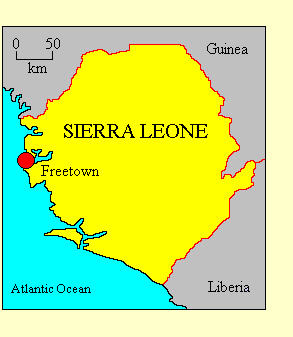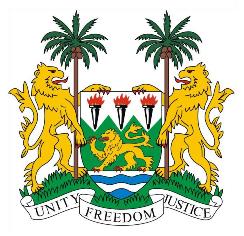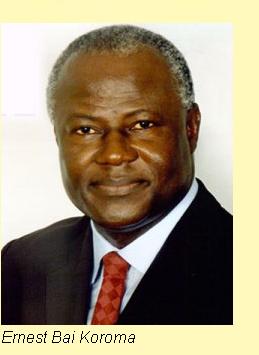

REPUBLIC OF SIERRA LEONE
• Official name: Republic of Sierra Leone
• Location: West Africa
• International organisations: African, Caribbean and Pacific Group of States, African Union,
Commonwealth of Nations, Non-Aligned Movement, Organisation of Islamic Conference, United
Nations, World Trade Organisation.
• Borders: Guinea, Liberia
• Coastline: Atlantic Ocean
• Land area: 71,740 Km2
• Population: 6,400,000
• Annual GDP (PPP) per capita: US$900 (2009 CIA estimate). World ranking: 182
• Ethnicity: Most of Sierra Leone's people are of West African stock, with the largest groups being
the Mende (31%), Themne (30%), Limba (10%) and Kuranko (3.7%). About 10% of the population are creoles,
descendants of freed West Indian slaves settled here in the 19th century. There are small minorities of
Europeans and Indians.
• Languages: English is the official language and the language of government and business. Many
African languages are spoken, corresponding to the ethnic groups listed above. About 10% speak Krio, a
West Indian creole. Arabic is also used in the Moslem community.
• Religion: Sunni Moslem 60%, indigenous beliefs 30%, various denominations of Christians 10%
• Form of government: Presidential democratic republic. Sierra Leone is divided into three provinces
and a special region in the west.
• Capital: Freetown
• Constitution: The Constitution of Sierra Leone came into effect
on 1 October 1991.
• Head of state: The President, elected by direct universal suffrage for a five-year term.
• Head of government: The President, who appoints the Cabinet.
• Legislature: Sierra Leone has a unicameral legislature, the
Parliament of Sierra Leone, which has 124
members: 112 elected for four-year terms by proportional representation from multi-member
constituencies, plus 12 members who hold seats by virtue of their positions as paramount chiefs.
• Electoral authority: The National Election Commission
(website offline) administers national elections.
• Freedom House 2009 rating: Political Rights 3, Civil Liberties 3
Political history
The British founded Freetown in 1791 as a settlement for emancipated slaves from the
West Indies. The settlement became a crown colony in 1808, and control was extended into the
interior in 1896. An elected assembly was introduced in 1926 and internal self-government
followed in 1953. Full independence followed in 1961.

In 1967 Siaka Stevens, leader of the socialist All-People's Congress, was
elected prime minister, but an army coup immediately removed him from office. A
second coup in 1968 restored Stevens to power, but he then established a one-party
regime, with himself as president from 1971. Stevens ruled until 1985, while the
country's economy gradually declined.
Stevens was succeeded by Joseph Saidu Momoh, who began a process of
transition to a multiparty system, but his regime was overthrown by
a coup in 1992. The army then ruled until 1996, when elections were held and
Ahmad Tejan Kabbah was elected President. Kabbah
was overthrown in yet another coup in 1997, which led to the outbreak of civil war and
the imposition of UN sanctions. In 1998 Kabbah returned to office.
In July 1999 a peace accord was signed between President Kabbah,
the rebels of the Revolutionary Armed Forces (RUF) and the Armed Forces Revolutionary
Council (AFRC). The agreement granted a
general amnesty from prosecution, despite the extensive crimes against humanity committed by both
RUF and the AFRC. Fresh elections were held in 2002 which installed
Kabbah and the Sierra Leone People's Party (SLPP) in power,
with the All People's Congress (APC) as the
opposition.
Despite continuing political and economic disorder, Sierra Leone managed to hold free and fair
presidential and legislative elections in 2007.
Ernest Bai Koroma of the APC defeated
Solomon Berewa of the SLPP in the presidential election. The SLPP, the APC and the People's Movement for Democratic Change (PMDC)
shared the seats in the legislature.
Freedom House's 2009
report on Sierra Leone
says: "Sierra Leone is an electoral democracy. The 2007 presidential and parliamentary elections were
judged to be free and fair by international observers, and for the first time since the civil war,
power was transferred peacefully to the opposition... Corruption is a major problem in Sierra Leone...
Sierra Leone was ranked 158 out of 180 countries surveyed in Transparency International's 2008
Corruption Perceptions Index... Freedoms of speech and the press are constitutionally guaranteed, but the
government at times restricts these rights... Freedoms of assembly and association are guaranteed by the constitution
and generally observed in practice... The judiciary has demonstrated a degree of independence, and a
number of trials have been free and fair. However, corruption, poor salaries, and a lack of resources
threaten to impede the courts' effectiveness."
Updated June 2010
|

